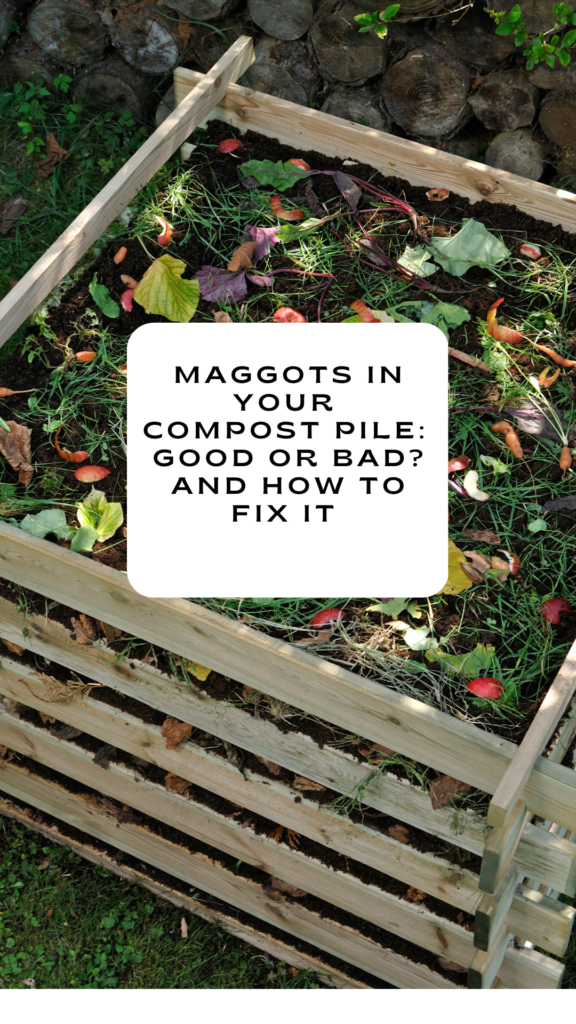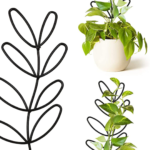Have you ever wondered if maggots in your compost were good or bad? Yes, I used to wonder the same. A maggot infestation in your compost tumbler is never a pleasant surprise especially after you’ve put time and effort into nurturing your compost heap.
Composting is an eco-friendly and extremely sustainable way to dispose of organic food waste and other biodegradable material that might’ve otherwise end up in your garbage bin.
However, sometimes compost piles can attract unwanted pest and visitors such as maggots and eventually flies.
In this post, we will discuss some tips for dealing with maggots in your compost pile.
Is it ok for maggots to be in my compost?
Creating a compost pile to create nutrient rich organic matter for your garden soil by using your kitchen waste is an affordable way to do great things for the planet. However, it’s easy for maggots to develop in a compost pile that is not well balanced between green material and brown material.
It is not ok for there to be maggots in your compost pile as adult flies will soon develop. Maggots are often found in garbage and compost piles that are rotting without enough oxygen to prevent it from creating a foul smell. It will soon begin to stink and possibly attract even more unwanted visitors. While the food scraps may start decomposing on their own with the maggots, there’s better ways to support the composting process.
FTC DISCLOSURE: Some of the links in this post are affiliate links. If you click on them and make a purchase, I will receive a small finder’s fee on the sale.
Here are 5 Tips To Help Get Rid of Maggots in Your Compost Pile:
#1. Properly balance your compost pile:
Maggots are attracted to overly moist environment. To avoid this, make sure to balance your compost pile with a mixture of “brown” materials or brown matter (e.g., dry leaves,, dry grass shredded newspaper) and “green” materials (e.g., fruit and vegetable scraps, grass clippings).
This will help regulate the moisture levels and prevent the pile from becoming too nitrogen-rich. Also avoid adding too many coffee grounds without adding well-dried things as mentioned above. Dead leaves are an easy and super affordable addition to your compost in this case. You can even save them from the fall season.
#2. Turn your compost pile regularly:
Turning your compost pile regularly helps to aerate it and can prevent maggots from thriving. Maggots need a moist and anaerobic environment to survive, so turning your compost pile helps to dry it out and promote oxygen flow.
I also avoid keeping the food scraps in plastic bags or super warm temperatures. Purchasing a tumbling composter is a great option if you have not had success with outdoor compost piles or a traditional bin composter.
#3. Cover your compost pile:
Covering your compost pile with a tarp or lid can help prevent flies from laying eggs on the organic material. Flies are attracted to rotting food, and their eggs hatch into maggots.
Keeping the flies away will reduce the likelihood of maggots appearing in your compost pile. Regulating the moisture content of your pile will also help deter the maggots who will easily lay eggs in your compost bucket.
11 Best Gardening Tools You Should Know
#4. Add lime to your compost pile:
Lime can help regulate the pH level of your compost pile and reduce the odor, which can deter flies from laying eggs in the first place. It’s easy to add a cup of lime to your compost container.
A healthy compost pile is one that is well balanced, and adding lime can absolutely be a good thing when a quick solution is needed.
#5. Use a compost bin:
If you have a persistent maggot problem, its a good idea using a compost bin with a lid. This will help contain the compost and prevent flies from getting in and laying eggs. I have been using the SubPod Composter.
In conclusion, learning how to control maggots in your compost pile can be unsightly and unpleasant, but with the right techniques, you can prevent and manage them. Properly balancing your compost pile, turning it regularly, covering it, adding lime, and using a compost bin are all effective strategies for keeping maggots at bay.
With a little effort and attention, you can enjoy the benefits of composting without the hassle of maggots. In no time you will have the rich compost mad out of organic waste to add to your garden.














